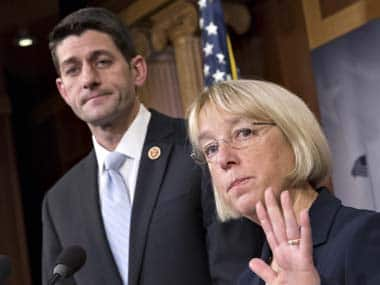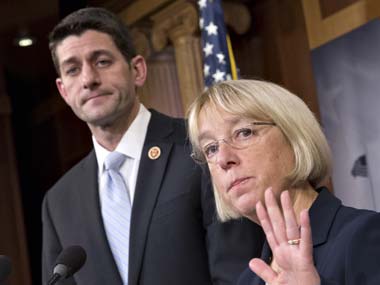Washington: The U.S. Congress is poised to adopt a $1.1 trillion package financing federal agencies this year, a bipartisan compromise that all but banishes the specter of an election-year government shutdown. The Democratic-controlled Senate planned to give final congressional approval to the immense spending measure, possibly as early as Thursday. The Republican-run House passed the package Wednesday in a lopsided 359-67 vote that underscored how both parties could claim wins in the measure — and how both saw deep perils in fighting over it. [caption id=“attachment_1343177” align=“alignleft” width=“380”]
 House Budget Committee Chairman Rep. Paul Ryan, R-Wis., left, and Senate Budget Committee Chair Sen.Patty Murray, D-Wash. AP[/caption] The legislation is a line-by-line follow-up to the budget compromise the two parties pushed through Congress in December that set overall spending limits for the next two years. The bill lawmakers were considering this week finances federal agencies through September. With the November congressional elections coming just weeks later, Congress is all but sure to provide more money later to avoid an election-eve budget clash. The legislation increases agency budgets by $26 billion over last year’s total. But it still leaves them $31 billion below where last year’s spending would have been if not for sequestration — budget-wide cuts triggered after lawmakers failed to agree to deficit-cutting savings. The measure let Republicans claim they have now restrained agency spending for four straight years. They won cuts to the Internal Revenue Service and Transportation Security Administration and foreign aid, restricted spending to implement President Barack Obama’s health care and financial regulation overhauls, and won renewal of provisions limiting federal assistance for abortions. The measure also lets legislators put budget battles behind them and turn to campaign-season themes: for the Republicans, Obama’s health care law and for Democrats, boosting the incomes of low-earners and the middle class. In the House, 64 of the 67 “no” votes came from Republicans, including many of the chamber’s most conservative members. Of the measure’s $1.1 trillion, $521 billion is for defense and $492 billion is for nondefense programs. In addition, the bill provides $92 billion for military action overseas, mostly in Afghanistan, and $7 billion for natural disasters. AP
House Budget Committee Chairman Rep. Paul Ryan, R-Wis., left, and Senate Budget Committee Chair Sen.Patty Murray, D-Wash. AP[/caption] The legislation is a line-by-line follow-up to the budget compromise the two parties pushed through Congress in December that set overall spending limits for the next two years. The bill lawmakers were considering this week finances federal agencies through September. With the November congressional elections coming just weeks later, Congress is all but sure to provide more money later to avoid an election-eve budget clash. The legislation increases agency budgets by $26 billion over last year’s total. But it still leaves them $31 billion below where last year’s spending would have been if not for sequestration — budget-wide cuts triggered after lawmakers failed to agree to deficit-cutting savings. The measure let Republicans claim they have now restrained agency spending for four straight years. They won cuts to the Internal Revenue Service and Transportation Security Administration and foreign aid, restricted spending to implement President Barack Obama’s health care and financial regulation overhauls, and won renewal of provisions limiting federal assistance for abortions. The measure also lets legislators put budget battles behind them and turn to campaign-season themes: for the Republicans, Obama’s health care law and for Democrats, boosting the incomes of low-earners and the middle class. In the House, 64 of the 67 “no” votes came from Republicans, including many of the chamber’s most conservative members. Of the measure’s $1.1 trillion, $521 billion is for defense and $492 billion is for nondefense programs. In addition, the bill provides $92 billion for military action overseas, mostly in Afghanistan, and $7 billion for natural disasters. AP
US Senate ready to send $1.1 trillion spending bill to Obama
FP Archives
• January 16, 2014, 12:39:01 IST
The Republican-run House passed the package Wednesday in a lopsided 359-67 vote that underscored how both parties could claim wins in the measure — and how both saw deep perils in fighting over it.
Advertisement
)